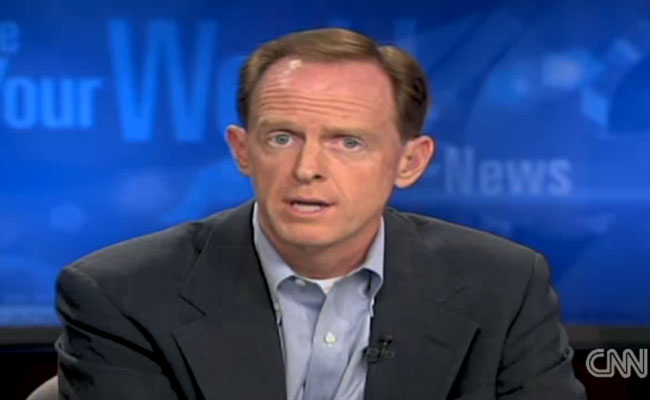Former Rep. Pat Toomey (R-PA) who is running for Senate against Rep. Joe Sestak (D-PA) made yesterday on CNN’s “John King USA” that caught our ear: he claimed that he once led a filibuster… on the House floor. Of course, the filibuster is a product of only the Senate’s rules.
On the show, Toomey claimed:
Now, when I was in the House, I — frankly I opposed my party very often. I opposed President Bush when he wanted to expand and create a new entitlement program. I opposed that. I personally led a filibuster on the House floor against my own party because I thought they were intending to bust the budget and spend too much money. The record is very clear.
The Senate defines a filibuster as the “Informal term for any attempt to block or delay Senate action on a bill or other matter by debating it at length, by offering numerous procedural motions, or by any other delaying or obstructive actions.” The Senate historian notes that the House hasn’t allowed filibusters since “the early years of Congress.”
Watch the video, where Toomey claims he led a filibuster at the 5:30 mark:
TPMDC contacted Toomey’s campaign for clarification. Communications Director Nachama Soloveichik told us, “We’ve often called it ‘an unheard of filibuster,'” adding that it was “characterized as such in the press.” She’s certainly right on the first count: a press release on Toomey’s campaign site from May 10, 2010 refers to the incident.
Pat also led an unheard of “filibuster” on the floor of the House of Representatives in 2002 in order to force both Democrats and Republicans to reduce spending (Associated Press, 07/17/02).
We went and found that article on Lexis-Nexis — and the word “filibuster” doesn’t appear in it at all. On the other hand, it does describe efforts by Toomey and Rep. John Shaddegg (R-AZ) to stymie passage of the appropriations bill to fund the Interior Department in 2003 because of additional monies added to the bill above the White House’s budget request.
Republican conservatives kept up pressure to trim spending on a House bill providing money for public lands and conservation, saying it was time to take a stand against budget-busting habits.
“These are grave issues. Spending is running out of control in this Congress,” said John Shadegg, R-Ariz., who spoke Wednesday as conservatives readied amendments designed to block progress on the domestic spending bill – the first the House has taken up this year.
“This is not a happy occasion for anybody here,” Rep. Pat Toomey, R-Pa., leader of the conservative rebellion, said late Tuesday. Toomey stressed that he had no intention of giving up his plan to offer one amendment after another.
The proposed amendments were handily defeated, but supporters said their goal was to point out the dangers of Congress ignoring President Bush’s budget recommendations.
The Bush White House didn’t oppose the bill, but objected to House efforts to add $700 million for fighting fires in 2002. The bill passed at 9:42 pm on July 17, 2002 without Toomey’s vote — but after about 16 hours of debate.
Soloveichik then pointed us to an opinion-laden article from July 22, 2002, originally published on the conservative website Human Events and archived here, in which then-editor Terence P. Jeffrey congratulated Toomey and his colleagues on their tactics.
They started as a Gang of Four from among the members of the conservative Republican Study Committee (RSC). Pat Toomey (Pa.) was the prime mover, joined by Jeff Flake (Ariz.), Mike Pence (Ohio) and John Shadegg (Ariz.), chairman of the RSC. They devised a strategy to counter the Cardinals [Ed. note: The term refers to the Appropriations subcommittee chairs].
If the Cardinals sent budget-busting bills to the floor early, the gang would launch what amounted to a filibuster. Under House rules for spending bills, members can offer amendments for each line ein in the bill. Every member is entitled to speak for five minutes on every amendment. The gang recruited about 25 RSC members willing to sponsor and speak for amendments. They would stall pork-laden bills until they were cut down to size, or the Cardinals capitulated.
Was Toomey’s efforts to slow passage of the bill by filing amendments a filibuster? By the definitions of the filibuster, decidedly not — regardless of how Jeffrey chose to characterize it in 2002. Does it show, however, that the Toomey campaign thinks it can make political hay out of his willingness to slow the passage of legislation in the Senate where he could, technically, filibuster? Definitely.









